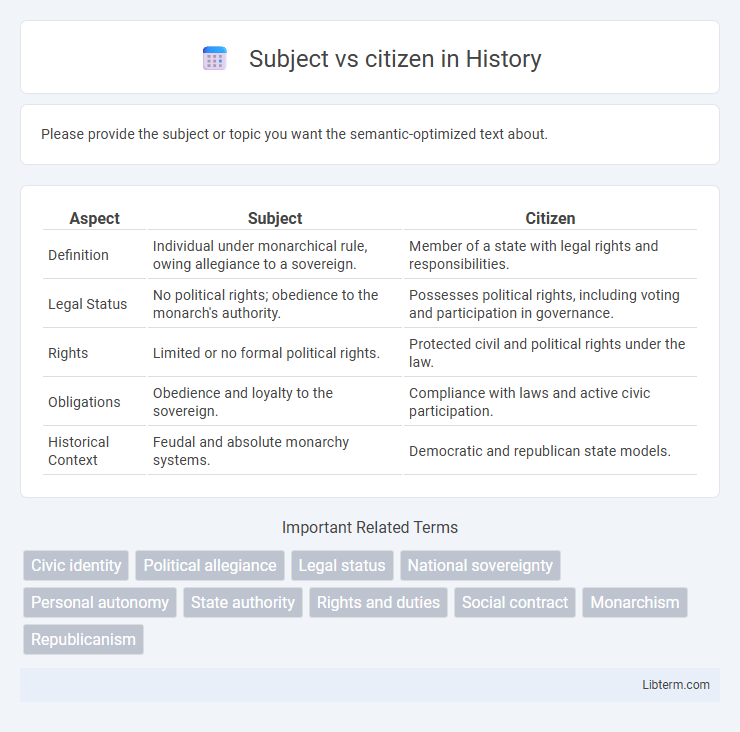Please provide the subject or topic you want the semantic-optimized text about.
Table of Comparison
| Aspect | Subject | Citizen |
|---|---|---|
| Definition | Individual under monarchical rule, owing allegiance to a sovereign. | Member of a state with legal rights and responsibilities. |
| Legal Status | No political rights; obedience to the monarch's authority. | Possesses political rights, including voting and participation in governance. |
| Rights | Limited or no formal political rights. | Protected civil and political rights under the law. |
| Obligations | Obedience and loyalty to the sovereign. | Compliance with laws and active civic participation. |
| Historical Context | Feudal and absolute monarchy systems. | Democratic and republican state models. |
Understanding the Concepts: Subject vs Citizen
A subject is an individual under the authority of a monarch or sovereign, often without guaranteed political rights, while a citizen possesses legal rights and responsibilities within a state or nation. Citizenship involves active participation in governance through voting, legal protections, and civic duties, distinguishing it from the passive status of a subject. Understanding these concepts clarifies the evolution from monarchical rule to modern democratic governance.
Historical Evolution: From Subjects to Citizens
The historical evolution from subjects to citizens marks a fundamental shift in political identity and rights, originating in feudal societies where individuals were subjects under monarchal authority. The Enlightenment era introduced ideas of popular sovereignty and individual rights, laying the groundwork for modern citizenship characterized by legal equality and civic participation. This transformation is evident in revolutionary movements and the development of constitutional democracies, where citizens gained political agency and protection under the law.
Legal Definitions: Subject and Citizen Explained
A subject is an individual under the authority of a sovereign or monarch, often without full political rights, reflecting a historical or monarchical legal framework. In contrast, a citizen is a legally recognized member of a state with defined rights and responsibilities under constitutional or statutory law, including participation in governance and protection by the state. Legal definitions distinguish subjects as passive followers of authority, whereas citizens hold active legal status with entitlement to civil liberties and political engagement.
Political Implications of Being a Subject or Citizen
Subjects are individuals under the authority of a monarch or ruling elite, often lacking political rights and participating indirectly in governance, which limits their influence on lawmaking and policy decisions. Citizens possess legal rights, political participation, and responsibilities within a sovereign state, enabling them to vote, run for office, and engage in democratic processes. The distinction between subjects and citizens directly impacts governance structures, individual freedoms, and the distribution of political power within a society.
Rights and Responsibilities: A Comparative Analysis
Subjects historically owe allegiance to a monarch, possessing limited political rights and mainly fulfilling duties dictated by sovereign authority. Citizens enjoy codified rights such as voting, freedom of speech, and legal protections, coupled with responsibilities including law observance and civic participation. The evolution from subjecthood to citizenship reflects a shift towards inclusive governance and recognized individual liberties within constitutional frameworks.
National Identity: How Status Shapes Belonging
Subjects traditionally owed allegiance to a monarch, reflecting a hierarchical national identity rooted in duty and obedience, whereas citizens possess legal rights and political participation that foster a sense of inclusion and belonging within a nation-state. National identity for subjects emphasized loyalty and subordination, often limiting personal agency, while citizenship embodies shared values, collective responsibility, and active engagement in civic life. The shift from subject to citizen redefines belonging by intertwining status with rights, identity, and participation in shaping national narratives.
Government Authority Over Subjects and Citizens
Government authority over subjects typically implies absolute control, where the ruler wields sovereign power without requiring consent, often seen in monarchies or autocracies. Citizens possess legal rights and obligations under a constitutional framework, enabling participation in governance and protection under the law. The distinction lies in subjects being governed by decree, whereas citizens engage with government authority through representation and legal equality.
Social Mobility and Participation in Governance
Subjects experience limited social mobility and minimal influence in governance, often confined to hierarchical structures with rigid class distinctions. Citizens possess greater opportunities for upward social mobility through education and economic participation, enabling them to actively engage in democratic decision-making processes. Enhanced political rights and legal protections empower citizens to contribute meaningfully to governance and societal development.
Subject vs Citizen in Modern Legal Systems
Subjects historically owed allegiance to a sovereign with limited personal rights, whereas citizens possess defined legal rights and participate in governance within modern legal systems. Modern legal frameworks emphasize citizenship as a status granting civil liberties, political participation, and protection under constitutional law, distinguishing it from the passive loyalty associated with subjects. This distinction underpins democratic principles, ensuring individuals have agency, legal recognition, and obligations within the state.
The Future: Changing Roles and Perspectives
Subjects historically owed allegiance to monarchs with limited political rights, while citizens possess defined legal rights and civic responsibilities within democratic states. Future shifts anticipate blurred distinctions as digital governance and transnational identities reshape political participation and legal status. Evolving roles emphasize adaptive citizenship, prioritizing inclusivity, global awareness, and active engagement in virtual and hybrid public spheres.
Subject Infographic

 libterm.com
libterm.com